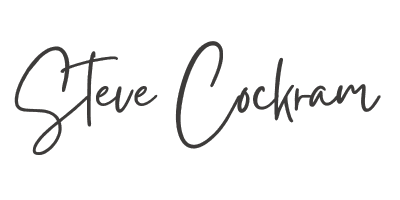Newsletter
/
Relational Intelligence at Work

Steve Cockram
on December 12, 2023
Hey, it's Steve Cockram here.
Welcome to the Relational Intelligence at Work newsletter where every Tuesday you’ll get an email directly to your inbox from either Jeremie or myself.
This newsletter's primary goal is to support you on your personal growth journey, and to equip you with the skills and knowledge you need to excel as a leader.
And for today’s story, I want to break down and share the history of a tool and resource many of you are likely familiar with…
The 5 Voices.
So let’s dive in…
I was 36,000ft above Iceland on a 9.5 hour flight from Heathrow to Atlanta when the idea came to me.
I’d been working on the concept of Voice archetypes for some time now but knew I had to deliver something concrete at a conference in Atlanta when I landed.
I was going to be speaking at our first ever Exec CORE conference, where 24 highly renowned leaders from across the US would be in attendance.“
I was tasked with discussing the topic of assessing your own unique personality traits and how to use them effectively within organisations and team environments.
And when looking at all of the different personality assessments and tools, they seemed to be one two ends of a spectrum.
There were the highly complex ones; Hogan, Berkman, and MBTI, which were explained to you by an expert and were incredibly helpful, but the language was too complicated to scale and be effective inside of an organization once you remove the expert.
On the other end of the spectrum, there were the much simpler, easier to use assessments; DISC, Colours, and Animals which were fun for a month or so, but after that, left everyone wondering if there was enough insight to actually make a difference to the performance of the team longer term.
So on this flight, I wanted to do my best to simplify all of the different resources as much as possible and come up with something of our own.
And the pressure of a deadline forced all of the conceptual thinking into a 5 Voices presentation.
Along Jeremie and I’s journey from the beginning to where we are today with GiANT, everything we created for leaders needed to be simple, scalable, and sustainable.
The tools needed to instill confidence and be easily taught to friends, colleagues, and others.
Whenever we would interact with different leaders across the world, a common question we ask is, “How much do you know about yourself? Have you ever done a personality test or assessment?”
And the answer is almost always, “Oh yeah, I’ve done tons of those.”
We’d respond back, “Great! What are you?”
And their answer is the same, “Hmm, I don’t remember now!”
The reality was, very few remembered or even knew what their personality assessments told them.
It was more of a one-and-done kind of thing, being helpful in the moment, but rarely being used after just a few weeks.
So on my overseas flight on my way to Atlanta, and after communicating my realisations with Jeremie and the team, we created something that will last much longer and leave a more meaningful impact on those who use it and understand it.
The 5 Voices.
The 5 Voices bridges the gap between too complicated to understand, and too simple to be effective.
It's simple enough that everyone can understand, and use the Voices language immediately, but it has a suite of additional resources that take the impact far deeper.
One of the biggest advantages is, after the initial set up and understanding of the 5 Voices, it gives the internal champions of the organisation the opportunity to lead the charge, removing the constant need for expensive consultants.
So let’s get into the 5 Voices.
Below, I’ll share with you a simple overview of each Voice, what they mean, and how to apply them practically in your team and organisation.

The Nurturer Voice
The Nurturer champions relationships and relational harmony, always thinking of other people and putting others ahead of themselves.
They intuitively feel how an organization will react to a new idea
They defend values - people will always come before profit
They take genuine delight in celebrating the achievements of others
They can become overly resistant to change & demonstrate passive aggressive tendencies
They rarely value the contribution they make
An interesting fact is 43% of people speak Nurturer as their first voice.
The Creative Voice
People who speak the Creative voice are always looking towards the future, thinking of innovation, new ideas, and always looking to push the envelope.
They are the conceptual architects and love to think outside the box
They function as an “early warning radar system” for teams, often seeing the opportunities and dangers long before everyone else
They are never satisfied with the status quo - they inherently believe things can always be better
They often struggle with the fact that "people never seem to fully understand my ideas”
Being internal perfectionists, they can often fail to celebrate the 90% that has been achieved, focusing instead on the 10% that hasn’t!
Creatives make up 9% of the population.
The Guardian Voice
You will typically always hear the Guardian voice in the group. They are custodians of tradition, stewarding the resources and protecting the infrastructure of the organisation.
They have a relentless commitment to ask the difficult questions
They have the ability to detach decision-making from personal sentiments
They are naturally risk averse asking "is it worth the risk and investment?"
They respect and value logic, order, systems and repeatable processes
Their desire for truth and right decisions can sometimes override the feelings of others
Guardians make up 30% of the population.
The Connector Voice
They champion strategic partnerships, networks, and connecting with people. They have a precise vision for what should be said and what other people will feel and hear.
They are persuasive and inspirational communicators - rallying people to causes and things they believe in
They are incredibly resourceful - “Whatever we need, I can get it or I have a source”
They have the capacity to maintain a large number of relationships
They know how to connect with people and their aspirations
They often struggle to hear or engage fully with critical feedback
Connectors make up 11% of the population.
The Pioneer Voice
They are champions of the big picture vision, understanding how to strategically align people, systems, and resources to go after big wins.
Visioning and shaping a scalable future is always the highest priority
Their strategic military thinking makes them incredibly effective at aligning people, systems and resources
Winning is a massive driver, they hate to give up and will drive their team long after others would have given up
They are powerful communicators, using logic and rationality to provide an attractive and compelling vision of the future
The immature Pioneer can often appear very arrogant with a “me focused” agenda
Pioneers make up only 7% of the population.
This is just a simple overview of each of the 5 Voices.
When we work with teams and organisations, we start here and go much deeper into understanding the nuances of:
Voice orders
The rules of team engagement
How to use the 5 Voices for collaboration
And much more.
The unfortunate reality is most organisations are operating at a diminished capacity significantly lower than their potential.
Fully embodying the 5 Voices allows you to reset expectations and lift others up based on their unique strengths, leading to increased production and transformation inside the team.
That's all for today's message. I hope you enjoyed!
Until next time,
Cheers from London!

Steve Cockram
Co-founder, GiANT Worldwide
P.S.
Join us Dec 20th at 9:30am ET
The Communication Code Training
Hear from Jeremie Kubicek and learn a step-by-step roadmap to improve your relationships and communication with those around you.
P.P.S.
If you’re interested, here are my voices in order from loudest to quietest:
Pioneer - Connector - Creative - Guardian - Nurturer
And here are Jeremie’s:
Connector - Creative - Pioneer - Nurturer - Guardian
Relational Intelligence is the science of highly-functional relationships (HFRs). Learn how to navigate and manage your interactions with others effectively.

